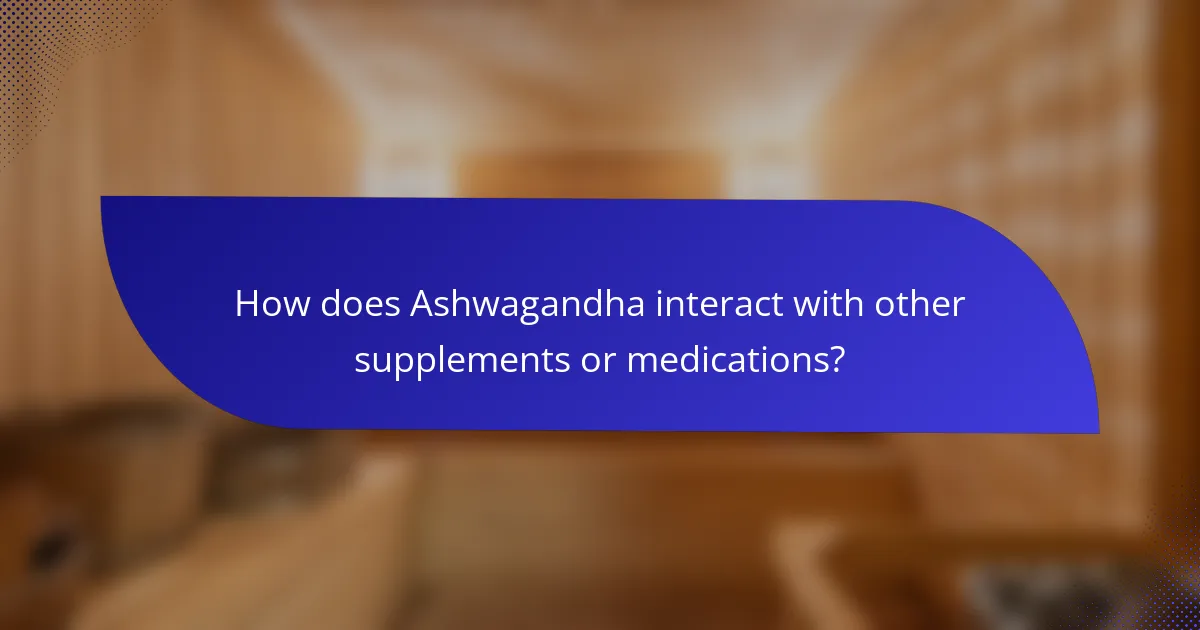Ashwagandha is known for its stress relief benefits, effectively lowering cortisol levels and enhancing mood. This article explores the recommended dosage for optimal effects, the various forms of intake available, and best practices for incorporating ashwagandha into your wellness routine. Understanding its potential side effects and interactions with other medications is also crucial for safe usage.

What are the stress relief benefits of Ashwagandha?
Ashwagandha significantly reduces stress by lowering cortisol levels and enhancing mood. Its adaptogenic properties help the body manage stress effectively. Regular intake can lead to improved mental clarity and reduced anxiety. Studies show that ashwagandha can decrease stress levels by up to 30% in some individuals.
How does Ashwagandha affect cortisol levels?
Ashwagandha significantly lowers cortisol levels, promoting stress relief. Studies show that ashwagandha supplementation can reduce cortisol by up to 30%. This adaptogenic herb helps the body manage stress effectively, which is crucial for overall health. Regular intake may enhance resilience to stressors and improve mood stability.
Which studies support Ashwagandha’s efficacy for stress relief?
Multiple studies support Ashwagandha’s efficacy for stress relief. Research indicates that it significantly reduces stress and anxiety levels in various populations. A randomized controlled trial published in the Journal of Clinical Psychiatry found that participants taking Ashwagandha experienced a 44% reduction in stress levels compared to a placebo group. Another study in the Indian Journal of Psychological Medicine showed that Ashwagandha supplementation led to significant reductions in stress and anxiety scores after eight weeks. Furthermore, a meta-analysis highlighted Ashwagandha’s adaptogenic properties, demonstrating its ability to enhance stress resilience. Overall, these studies confirm Ashwagandha’s potential as an effective natural remedy for stress relief.
What additional mental health benefits does Ashwagandha offer?
Ashwagandha offers additional mental health benefits including improved mood, enhanced cognitive function, and reduced symptoms of anxiety. Studies show it may help regulate cortisol levels, promoting emotional stability. Furthermore, it supports memory and concentration, contributing to overall mental clarity.

What is the recommended dosage of Ashwagandha for stress relief?
The recommended dosage of Ashwagandha for stress relief typically ranges from 300 mg to 600 mg per day. This dosage is based on studies showing its effectiveness in reducing stress and anxiety levels. Most supplements provide this dosage in capsule or powder form, making it easy to incorporate into daily routines. For optimal results, it’s advisable to consult with a healthcare provider before starting any new supplement regimen.
How does dosage vary by individual needs?
Dosage of ashwagandha varies based on individual needs, including weight, health status, and stress levels. Factors such as age and lifestyle also influence the appropriate amount. Generally, a standard dosage ranges from 300 mg to 600 mg daily, but some may require adjustments. Consulting a healthcare professional ensures personalized recommendations.
What are the factors influencing Ashwagandha dosage?
Several factors influence Ashwagandha dosage, including individual health conditions, age, and desired effects. The standard dosage typically ranges from 300 mg to 600 mg per day. Higher doses may be necessary for specific conditions, but consulting a healthcare professional is essential. Additionally, the form of Ashwagandha (powder, capsule, or tincture) can also affect the appropriate dosage.
How do different forms of Ashwagandha affect dosage?
Different forms of Ashwagandha affect dosage based on their concentration and bioavailability. For instance, root powder typically requires higher doses, around 3-6 grams daily, while standardized extracts may be effective at lower doses of 300-600 mg. Liquid extracts can vary widely, often requiring about 1-2 teaspoons. The unique attribute of each form influences how the body absorbs the active compounds, impacting overall effectiveness.

What forms of intake are available for Ashwagandha?
Ashwagandha is available in several forms of intake, including capsules, powders, tinctures, and teas. Each form offers unique benefits and convenience for users.
Capsules provide a precise dosage and are easy to consume. Powders can be mixed into smoothies or meals, allowing for versatile use. Tinctures offer rapid absorption and can be taken sublingually. Teas provide a soothing experience and can be enjoyed as part of a relaxation routine.
Selecting the right form depends on personal preference and lifestyle.
Which are the most common forms of Ashwagandha?
Ashwagandha is commonly available in several forms: powder, capsules, tinctures, and extracts. Each form offers unique benefits and ease of use. Powder is often mixed with beverages, while capsules provide convenient dosing. Tinctures offer rapid absorption, and extracts deliver concentrated doses for targeted effects.
How do liquid extracts compare to capsules?
Liquid extracts of ashwagandha offer faster absorption compared to capsules. Extracts provide immediate effects, while capsules may require longer digestion. Extracts often contain higher concentrations of active compounds, enhancing their efficacy. Capsules, however, offer convenience and precise dosage.
What are the pros and cons of powdered Ashwagandha?
Powdered Ashwagandha offers various benefits and drawbacks.
Pros include stress reduction, improved sleep quality, and enhanced cognitive function. It is versatile, available as capsules, powders, or teas, allowing for easy incorporation into daily routines.
Cons involve potential digestive discomfort, interactions with medications, and varying quality among products. Some users may experience side effects like drowsiness or headaches.
Choosing a high-quality source and consulting a healthcare provider can mitigate risks.

How does the quality of Ashwagandha affect its benefits?
The quality of Ashwagandha significantly influences its stress relief benefits. Higher quality Ashwagandha contains more potent active compounds, such as withanolides, which enhance its effectiveness. Studies show that premium extracts can improve anxiety and stress reduction by up to 30% compared to lower quality products. Additionally, the extraction method affects bioavailability, with water-based extracts often delivering superior results. Consumers should look for standardized extracts to ensure consistent quality and maximum benefits.
What should consumers look for in high-quality Ashwagandha?
Consumers should look for high-quality Ashwagandha that is standardized to contain a minimum of 5% withanolides, ensuring potency. Additionally, check for third-party testing to confirm purity and absence of contaminants. Organic certification is important for avoiding pesticides. Consider the form of intake; capsules and powders are common, but tinctures offer faster absorption. Lastly, verify the source of the Ashwagandha; sustainably harvested roots are preferable for optimal efficacy.
How do sourcing and processing impact Ashwagandha’s effectiveness?
Sourcing and processing significantly influence Ashwagandha’s effectiveness. High-quality roots from mature plants enhance potency, while extraction methods affect bioavailability. For example, water extraction preserves more active compounds compared to alcohol extraction. Additionally, standardized products ensure consistent dosages, optimizing stress relief benefits.

What are the potential side effects of Ashwagandha?
Ashwagandha may cause mild side effects such as gastrointestinal discomfort, diarrhea, and nausea. Some individuals may experience drowsiness or headaches. Rarely, it can lead to allergic reactions or hormonal changes. Always consult a healthcare professional before starting any supplement.
Which populations should avoid Ashwagandha?
Individuals with autoimmune diseases, thyroid disorders, or those taking sedatives should avoid Ashwagandha. Pregnant or breastfeeding women are also advised against its use. These populations may experience adverse effects due to Ashwagandha’s ability to influence immune function and hormone levels. Always consult a healthcare provider before starting any new supplement, especially if you belong to these groups.
How can users mitigate potential side effects?
Users can mitigate potential side effects of ashwagandha by starting with a low dosage and gradually increasing it. Monitoring individual reactions is crucial. Staying hydrated and consulting with a healthcare professional ensures safe usage. Additionally, taking breaks from supplementation can help reduce tolerance and side effects.

How does Ashwagandha interact with other supplements or medications?
Ashwagandha may interact with certain supplements and medications, potentially enhancing or diminishing their effects. For instance, it can amplify the sedative effects of anti-anxiety medications or sleep aids. Additionally, it may lower blood sugar levels, which could affect diabetes medications. Ashwagandha’s unique attribute of adaptogenic properties allows it to influence stress responses, making it essential to consult a healthcare provider before combining it with other treatments. This ensures safety and optimal efficacy, particularly for individuals with existing health conditions.
What are the common interactions to be aware of?
Ashwagandha can interact with certain medications, so awareness is essential. Common interactions include sedatives, thyroid medications, and immunosuppressants. These interactions may enhance sedative effects, alter thyroid hormone levels, or affect immune response. Always consult a healthcare professional before combining ashwagandha with other treatments.
How can users safely combine Ashwagandha with other treatments?
Users can safely combine Ashwagandha with other treatments by consulting healthcare professionals first. This ensures compatibility with medications or therapies. Ashwagandha may enhance the effects of certain treatments, such as anxiety medications, but can also interact with others, like blood thinners. Monitoring for side effects is essential when combining treatments. Starting with a low dosage of Ashwagandha can help gauge tolerance and effectiveness.

What are the best practices for incorporating Ashwagandha into a wellness routine?
To effectively incorporate Ashwagandha into a wellness routine, consider the following best practices.
1. **Choose the Right Form**: Ashwagandha is available in various forms, including powder, capsules, and liquid extracts. Select one that fits your lifestyle and preferences.
2. **Determine the Appropriate Dosage**: A common dosage ranges from 300 to 600 mg of standardized extract per day. Start with a lower dose to assess tolerance and gradually increase.
3. **Timing of Intake**: For stress relief, take Ashwagandha in the morning or early afternoon. If using it for sleep support, consider taking it in the evening.
4. **Consistency is Key**: Incorporate Ashwagandha into your daily routine for optimal results. Regular intake enhances its adaptogenic effects.
5. **Monitor Effects**: Keep track of how you feel after starting Ashwagandha. Adjust the dosage or consult a healthcare professional if necessary.
When is the best time to take Ashwagandha for optimal results?
The best time to take Ashwagandha for optimal results is in the morning or evening. Morning intake can boost energy and focus, while evening use may enhance relaxation and sleep quality. Consistency in timing helps maintain stable levels of its active compounds.
How can lifestyle factors enhance Ashwagandha’s stress relief effects?
Lifestyle factors can significantly enhance Ashwagandha’s stress relief effects. Regular exercise, a balanced diet, and adequate sleep synergistically improve Ashwagandha’s ability to reduce cortisol levels and promote relaxation. For example, engaging in physical activity increases endorphins, which can amplify the adaptogenic properties of Ashwagandha. Additionally, a diet rich in antioxidants supports overall mental health, further enhancing stress relief. Prioritising sleep restores hormonal balance, allowing Ashwagandha to function more effectively. Together, these lifestyle choices create a holistic approach to managing stress.